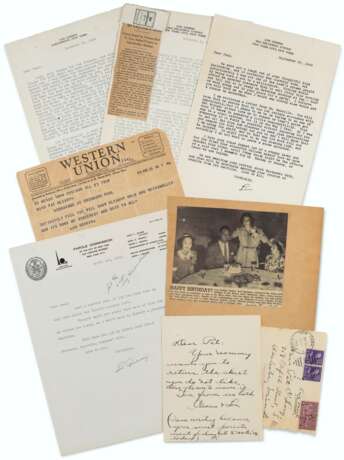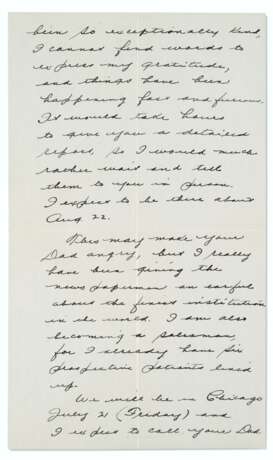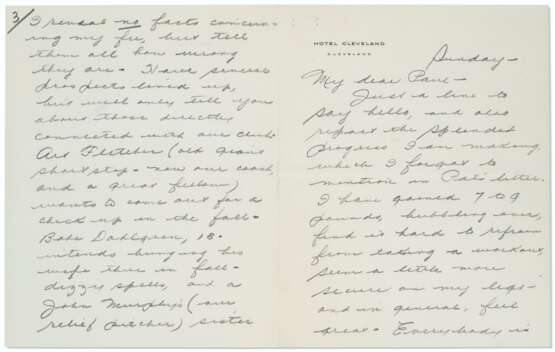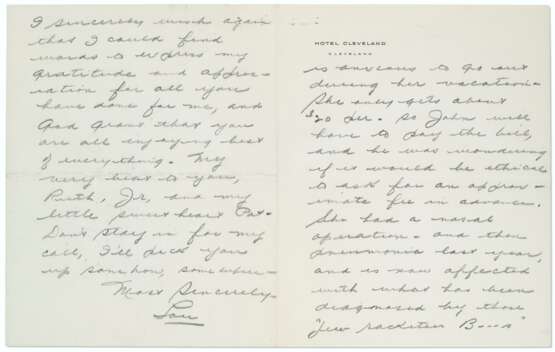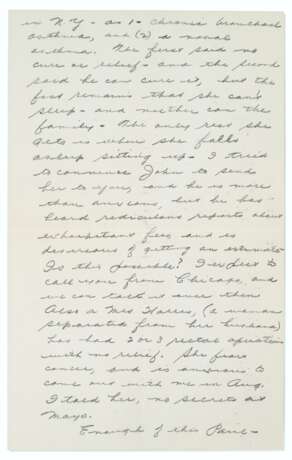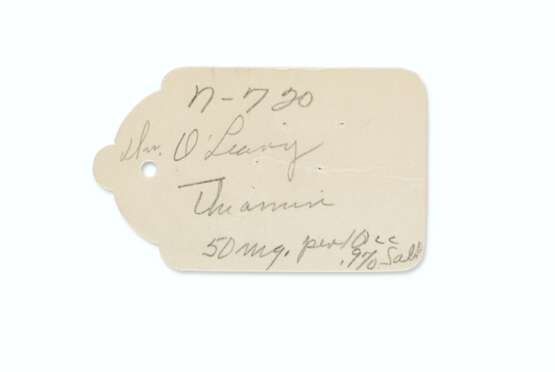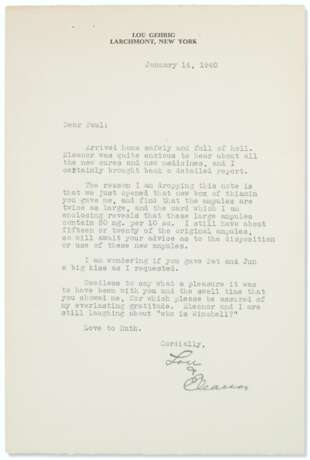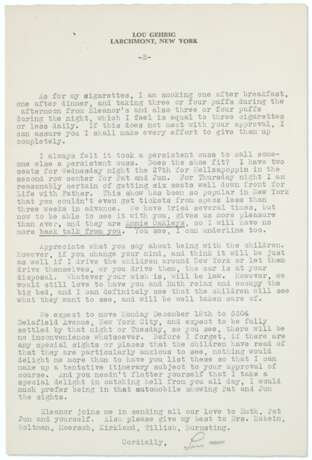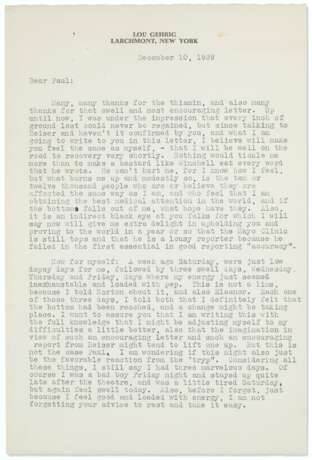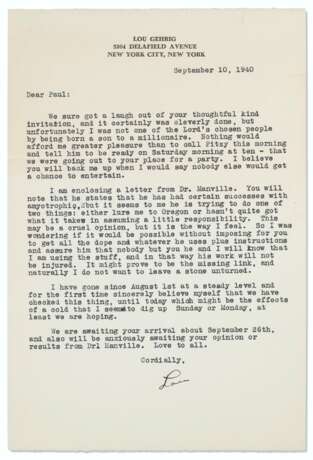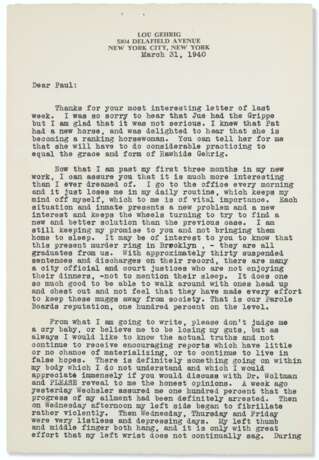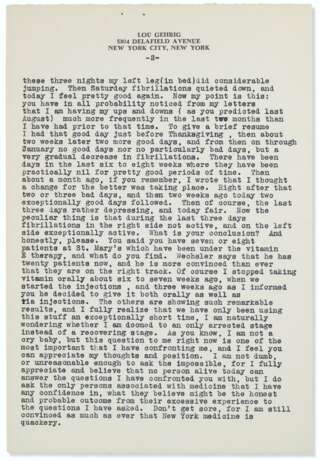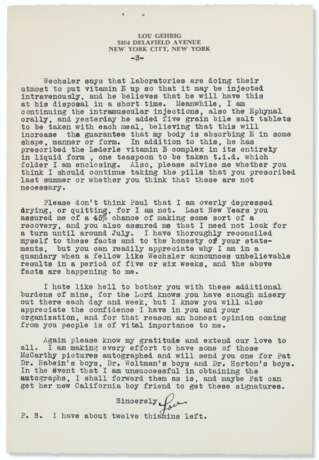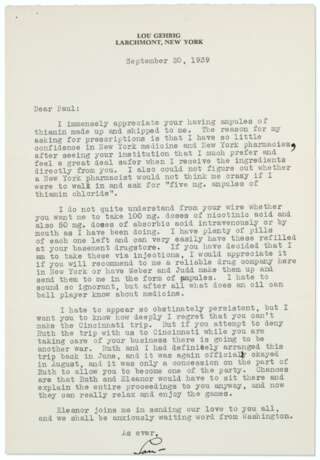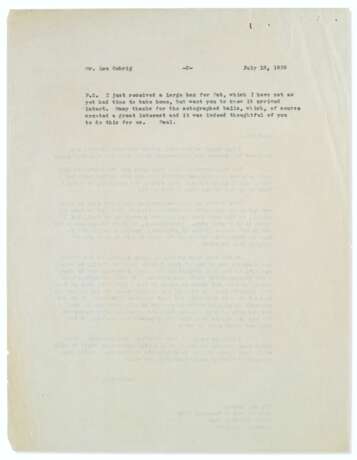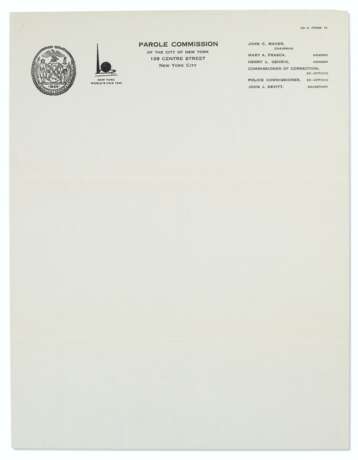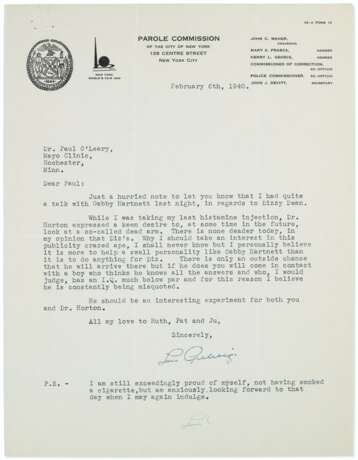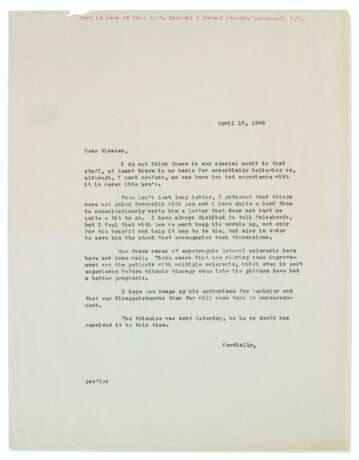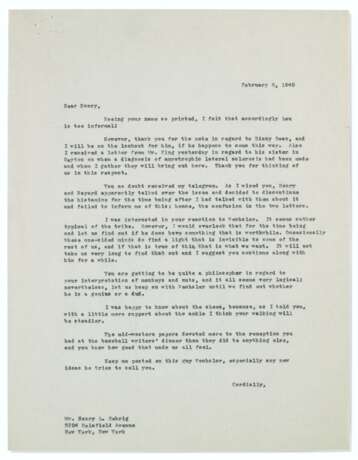Highly Important Lou Gehrig Document Archive From Dr Paul O'...
16.12.2020 10:00UTC +00:00
Classic
Verkauft
450000USD $ 450 000
| Auctioneer | CHRISTIE'S |
|---|---|
| Veranstaltungsort | Vereinigtes Königreich, London |
| Aufgeld | see on Website% |
Archiv
Die Auktion ist abgeschlossen. Es können keine Gebote mehr abgegeben werden.

ID 465317
Los 87 | Highly Important Lou Gehrig Document Archive From Dr Paul O'...
Schätzwert
$ 400 000 – 600 000
Although the New York Yankees again secured the World Championship title in 1938, there were anomalies to Lou Gehrig's performance during the season. His numbers, by mortal standards, were very fine, but in comparison to his typical career statistics, there was a marked drop. In late 1938, Lou Gehrig explained, "I tired mid season. I don't know why, but I just couldn't get going again." Even during the 1938 World Series, Lou managed only four singles, which was further indication of his notable drop in power hitting.
With the coming of spring in 1939, the Yankees readied themselves to defend their two previous consecutive World Championships. At the very beginning of Spring Training, it was evident that something was not right with Lou Gehrig. Sportswriter James Kahn remarked at the time, "I think there is something wrong with him. Physically wrong, I mean. I don't know what it is, but I am satisfied that it goes far beyond his ball-playing. I have seen ballplayers 'go' overnight, as Gehrig seems to have done. But they were simply washed up as ballplayers. It's something deeper than that in this case, though. I have watched him very closely and this is what I have seen: I have seen him time a ball perfectly, swing on it as hard as he can, meet it squarely, and drive a soft, looping fly over the infield. In other words, for some reason that I do not know, his old power isn't there... He is meeting the ball, time after time, and it isn't going anywhere." Others took notice as well. Manager Joe McCarthy, who had always been one of Gehrig's closest mentors on the Yankees, tried to support Gehrig's meager play, hoping that he would eventually snap back to the form once considered as a given for the Yankee slugger.
During the first month of the 1939 season, Gehrig's statistics were abysmal with a .143 batting average and only a single RBI. On April 30, 1939, the Yankees were at home playing a game against the Washington Senators. As the 1939 World's Fair opened across town to enormous crowds, the Yankees played the April 30th game before a modest gate number of 23,712. Little did those fans realize they were witnesses to history. Gehrig went 0 for 4 that fateful day, adding fuel to the swirling speculation that he should be removed from the Yankees lineup. The next day was a day off, before the team would open a series in Detroit against the Tigers. On May 2, 1939, Lou Gehrig sought out Yankees manager Joe McCarthy in the Book Cadillac Hotel in Detroit. Arthur E. Patterson recounted the meeting in the New York Herald Tribune: "Joe, I'd like to talk to you," Gehrig said. "Sure thing, Lou. C'mon around the corner here and sit down," McCarthy said. "Joe, I'm not helping this team any," Gehrig said. "I know I look terrible out there. This string of mine doesn't mean a thing to me. It isn't fair to the boys for me to stay in there. Joe, I want you to take me out of the lineup today." While it was difficult for Gehrig's longtime friend and manager to hear, McCarthy understood Gehrig's intentions and granted his request.
At the insistence of Gehrig himself, in what has become one of the more legendary and poignant moments of the era, Gehrig mandated that he be permitted to deliver the lineup card to home plate on May 2, 1939 without his name written in the starting nine. With tears in the eyes of the once great and powerful Yankee slugger, Gehrig stoically presented the Yankees lineup card to the umpires with the name "Babe Dahlgren" written in as first baseman, so ending his streak of 2,130 consecutive games played. John Kieran of The New York Times wrote, "So they unhitched the Iron Horse from the old wagon, but Marse Joe McCarthy didn't order him to be taken behind the barn and destroyed." More tragically, it would mark the beginning of the final chapter in Gehrig's life, as he was diagnosed shortly thereafter with a terminal illness, amyotrophic lateral sclerosis. Although Gehrig would press on to deliver the most famous oration in sports history with his July 4, 1939 "Luckiest Man" speech, his stature as the "Iron Man" of baseball had come to an end. Fitting for a man of Gehrig's integrity, the "Iron Horse" succumbed to the horrid disease on June 2, 1941, at 10:10 p.m., sixteen years to the day after he had first replaced Wally Pipp as first baseman for the New York Yankees.
On that date of May 2, 1939, when Lou Gehrig unexpectedly walked to home plate to deliver the lineup card, the umpires, according to period news accounts, were "stunned" to see that Gehrig was not in the lineup. Preceding the game, the Detroit Tigers announcer revealed to the crowd at Briggs Stadium, "Ladies and gentlemen, this is the first time Lou Gehrig's name will not appear on the Yankee lineup in 2,130 consecutive games." During the announcement, Lou Gehrig sat on the Yankees bench with tears in his eyes, almost as if he himself knew that his body was failing. Although there had been no foe on the baseball diamond to challenge Gehrig's prowess, he would now begin a fight the likes of which he had never encountered.
The mysterious illness that Gehrig was battling called for the finest care in the country which included Dr. Paul O'Leary from the Mayo Clinic. Gehrig developed a close friendship with O'Leary that lasted for the remainder of his lifetime. Offered is the original archive of documents as retained by Dr. O'Leary including numerous letters with extremely significant historical content as it related to Gehrig's illness. The archive contains approximately (92) pieces in totals including letters from Lou Gehrig to Dr. O'Leary, carbon copies of letters from Dr. O'Leary to Gehrig, original telegrams to and from Gehrig, New York Parole Commission letters from Gehrig, and other miscellaneous paper ephemera. Highlight items to be listed as follows, but we strongly encourage in person review of the archive to interested parties:
1) Incredible two page (front and back) handwritten letter in pencil sent from Gehrig to O'Leary with lengthy content regarding his illness, progress, and gratitude. Gehrig writes, in part, "Just a line to say hello, and also report the splendid progress I am making." ; "Everyone is commenting (sincerely I hope, not just to offer encouragement) on how much better I look." ; "Please be assured I am following your instructions to the letter T-and anyone who dares interfere really finds out that Mayo is the greatest institution on the face of this earth." Signed, "Most sincerely, Lou".
2) Dated 7/14/1939 handwritten two page letter (front and back) in ink sent from Gehrig to Pat O'Leary with content regarding sending them several photos (presumably autographed) to be distributed along with a "glove for Skip Graham". Signed, "Always, Lou".
3) Dated 9/20/1939 typewritten letter sent by Gehrig to Dr. O'Leary with content regarding a regimen of prescribed thiamin. Gehrig writes, "I hate to sound so ignorant, but after all what does an oil can ball player know about medicine." Signed, "Lou" in black ink at bottom of the letter.
4) Dated 12/10/1939 typewritten two page letter sent to O'Leary from Gehrig with extensive content regarding his illness and related treatments. Gehrig writes, "I was under the impression that every inch of ground lost could never be regained, but since talking to Reiser and haven't it confirmed by you, and what I am going to write you in this letter, I believe I will make you feel the same as myself-that I will be well on the road to recovery very shortly.", "Of course I was a bad boy Friday night and stayed up quite late after the theatre, and was a little tired Saturday, but again feel swell today." Signed "Lou" in pencil at bottom of last page.
5) 1/14/1940 One page typewritten letter from Gehrig to O'Leary with content including "Arrived home safely and full of hell." Signed at bottom "Lou & Eleanor" by Eleanor Gehrig.
6) 2/4/1940 Two page typewritten letter sent to O'Leary from Gehrig with content including Gehrig remaking about trial therapy on monkeys to treat amyotrophic muscle issues. Lou questions the validity of another doctor's opinion. At the end of the letter he includes, "I am on my way to the Baseball Writer's Dinner tonight, and if it is possible at all, I shall make every effort to send an autographed menu to Pat". Amazingly, the archive includes the actual signed program that Gehrig references in his letter. Program is signed on the back by several attendees including Herbert Hoover, Honus Wagner, Ed Barrow and Ford Frick, with the pencil autographs having been enhanced in ink.
7) Poignant three page typewritten letter sent by Gehrig to O'Leary with detailed content regarding Gehrig's symptoms and general outlook. Gehrig writes, "From what I am going to write, please don't judge me a cry baby, or believe me to be losing my guts, but as always I would like to know the actual truths and not continue to receive encouraging reports which have little or no chance of materializing, or to continue to live in false hopes. There is definitely something going on within my body which I do not understand....". Signed "Lou" in black ink on last page by Eleanor Gehrig.
8) 5/25/1940 One page typewritten letter from Gehrig to O'Leary with content regarding female hormone therapy to include, "So now you can appreciate the laugh, that they are trying to put female into me, and in all probability when you get here in June I'll be effiminate enough to make the God damnnest play for you...." Signed "Lou" in black ink.
Additional letters and documents each chronicle Gehrig's fight with the horrific disease some in stark detail. The archive clearly illustrates the progression of Gehrig's disease in addition to his personal view of same beginning with optimism and infused with courageous yet fearsome reverence as time passed. An incredible archive of historic letters related to one of the most storied and yet tragic figures in the history of American sport. Includes full LOAs from PSA/DNA and JSA on the Lou Gehrig signed letters: Range EX-NM
| Adresse der Versteigerung |
CHRISTIE'S 8 King Street, St. James's SW1Y 6QT London Vereinigtes Königreich | |
|---|---|---|
| Vorschau |
| |
| Telefon | +44 (0)20 7839 9060 | |
| Aufgeld | see on Website | |
| Nutzungsbedingungen | Nutzungsbedingungen |
